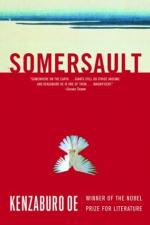|
This section contains 575 words (approx. 2 pages at 300 words per page) |

|
SOURCE: A review of Teach Us to Outgrow Our Madness, in World Literature Today, Vol. 52, No. 2, Spring, 1978, pp. 345-46.
[In the following review of the English publication of Teach Us to Outgrow Our Madness, Sakurai hails Ōe as a major international talent.]
Teach Us to Outgrow Our Madness [translated by John Nathan] is the third publication in English of the extraordinary works of Kenzaburo Ōé, the most talented writer to emerge in Japan after World War II. Like his previous publications (A Personal Matter, 1968, also translated by John Nathan, and The Silent Cry, 1975), this book is certain to surprise some Western readers who have come to expect delicate prose and exquisite imagery from a Japanese novelist. Having learned his craft from postwar American authors such as Norman Mailer and French existentialists such as Jean-Paul Sartre, rather than from The Tale of Genji, Ōé writes fiction that is more brutal and...
|
This section contains 575 words (approx. 2 pages at 300 words per page) |

|


